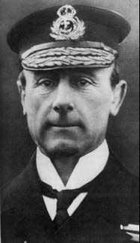John Jellicoe, 1st Earl Jellicoe
|
|
Admiral of the Fleet Sir John Rushworth Jellicoe, 1st Earl Jellicoe (December 5, 1859–November 20, 1935) was a British Royal Navy admiral.
He was born in Southampton into a sea-faring family. He joined the Royal Navy as a cadet in 1872. His first active service was during the Egyptian War of 1882. He was appointed to the Admiralty in 1888.
Promoted to commander in 1891, Jellicoe was the executive officer (i.e. second in command) of HMS Victoria when she was accidently rammed and sunk with heavy loss of life in the Mediterranean in 1893.
Jellicoe had a number of commands in the 1890s, and in 1900 he was part of the command for the land relief of Beijing during the Boxer Rebellion, the First Peking Relief Expedition.
Under John Fisher, Jellicoe was Director of Naval Ordnance (1905-1907) and then Controller of the Navy (1908-1910). He pushed hard for funds to modernise the navy, supporting the construction of new designs of dreadnought and submarine.
In 1911 Jellicoe became deputy to George Callaghan, the Commander of the Grand Fleet. At the start of World War I, August 4, he was promoted to command the Grand Fleet. He was in command of the fleet at Jutland (1916), where his caution was later criticized despite Winston Churchill having described him as the man who could lose the war in a single afternoon. He was made First Sea Lord in November 1916, succeeding Sir Henry Jackson. But his refusal to institute the convoy system lead to his replacement in 1917 by Rosslyn Wemyss, then David Beatty. He was made a Viscount in 1918.
Jellicoe was Governor-General of New Zealand from September 1920 to November 1924. On his return to England in 1925 he was made an Earl.
Jellicoe was an intelligent and dedicated officer. Popular with his crews, he was very concerned with the well-being and morale of his sailors. He was also a micromanager, to the point of driving himself to exhaustion at times. His handling of the Grand Fleet at the Battle of Jutland demonstrated both his strengths and weaknesses as a leader.
| Preceded by: Sir Henry Jackson | First Sea Lord 1916–1917 | Succeeded by: Sir Rosslyn Wemyss | |||
| Preceded by: The Earl of Liverpool | Governor-General of New Zealand 1920–1924 | Succeeded by: Sir Charles Fergusson
|

